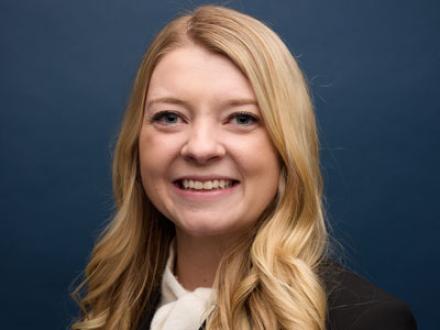
Patient-centered solutions: Nursing’s Megan Wenzell researches interventions for sleep problems in children with autism
Megan Alder Wenzell
Assistant Professor, Frances Payne Bolton School of Nursing
Area of Focus: Sleep and physical activity in autistic children, behavioral sleep interventions to promote sleep health, sleep health disparities in pediatrics, actigraphy assessment of sleep and physical activity
As a nurse at a community health residential center for children with autism, Megan Wenzell saw firsthand how sleep disturbances impacted patients’ overall health.
Poor sleep quality can lead to both short- and long-term health consequences, including heightened daytime behaviors and impaired learning. Over time, poor sleep quality may impose serious health conditions, affecting the cardiovascular, endocrine, and immune systems.
The challenge is more common among children with autism, as many as 53-78% of whom experience sleep problems—twice the prevalence of the general pediatric population, said Wenzell, assistant professor at Frances Payne Bolton School of Nursing.
In her research at Case Western Reserve University, Wenzell is investigating interventions that could help alleviate these sleep challenges for children with autism and their families. While most sleep interventions have been conducted in early childhood, Wenzell’s work aims to fill this gap by focusing on school-age children who often have fears and anxious thoughts about sleep, have more access to stimulating activities at bedtime, and may face increasing school and social demands. Wenzell’s current intervention includes strategies, such as establishing regular sleep-wake times and learning a wake-up routine.
At the heart of her work is the very patients she seeks to help.
Wenzell works directly with families to understand their concerns about their child’s sleep and tailoring interventions that could give them personalized solutions.
To support her work, she recently received a junior investigator grant from the American Academy of Sleep Medicine for a pilot randomized controlled study titled “Community-Engaged Sleep Intervention for School-Age Children with Autism.” Wenzell asked families for feedback on a parent-mediated intervention.
In addition to working with families, Wenzell has collaborated closely with community partners—including therapists, clinicians, teachers and other stakeholders in Northeast Ohio—to develop a community advisory board that helps support intervention adaptations and fill gaps in recruitment.
A common touch point with the healthcare system, nurses work closely with patients who have autism, making them well-suited to conduct research on the condition.
“Nurses have a big role in helping advocate for families and helping them achieve health and preventative treatment as well,” Wenzell explained. “Sleep is so important to prevent long-term chronic conditions, such as high blood pressure and diabetes.”




